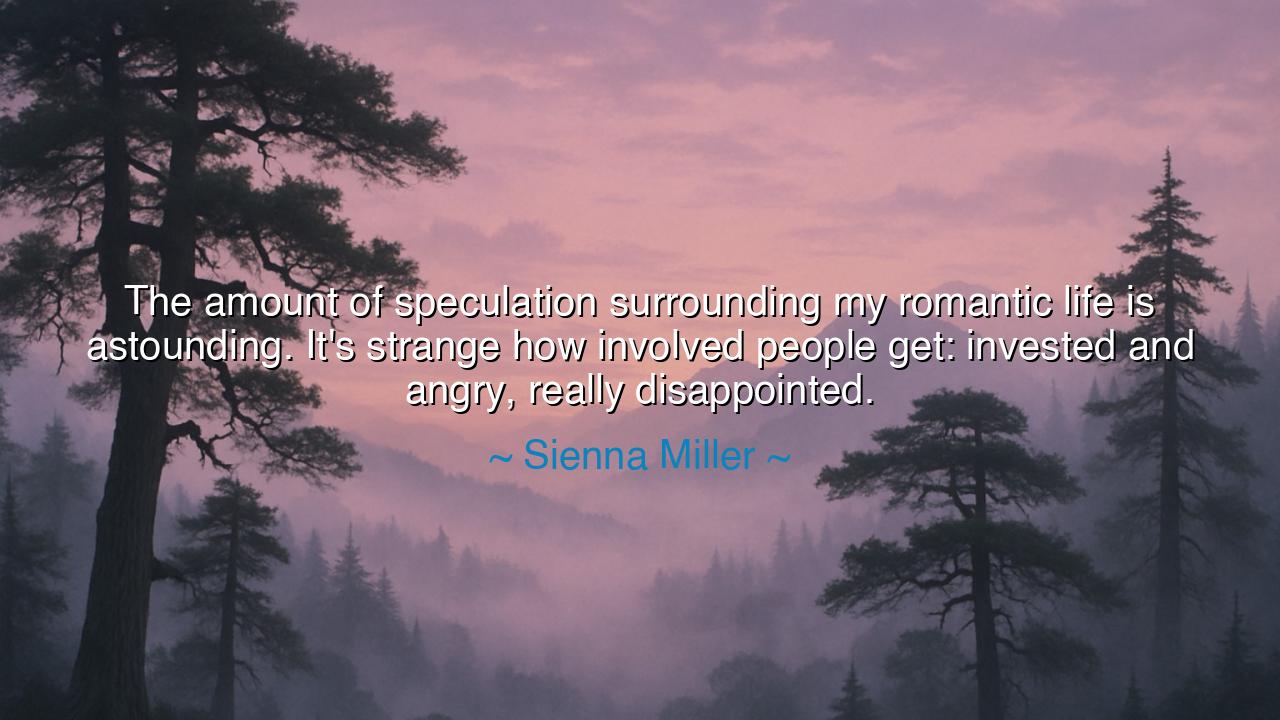
The amount of speculation surrounding my romantic life is
The amount of speculation surrounding my romantic life is astounding. It's strange how involved people get: invested and angry, really disappointed.






In the words of Sienna Miller, “The amount of speculation surrounding my romantic life is astounding. It’s strange how involved people get: invested and angry, really disappointed.” This statement is not merely a reflection of her personal experience, but a mirror held up to society itself. It reveals how love, which is sacred and private, is too often dragged into the marketplace of gossip and judgment. For in every age, the loves of others have stirred curiosity, but in our modern world of constant eyes and endless voices, that curiosity has grown into obsession.
The ancients knew well the power and peril of public scrutiny. Consider Helen of Troy, whose romantic life—her love, her choices, her entanglements—was cast into legend, judged by kings, poets, and entire nations. Her heart became a battlefield, her image the cause of war, her name either cursed or adored. In her story, we see what Miller describes: the way people become invested in lives not their own, angry when those lives do not align with their expectations, disappointed when their imagined tales collapse before reality.
To be watched is to be burdened. The romantic life is the most fragile of gardens, needing care, patience, and privacy to grow. Yet when it is exposed to the glare of many eyes, it becomes vulnerable. The crowd demands drama, demands purity, demands stories that satisfy their hunger for fantasy. When reality fails to match their vision, they turn bitter, as Miller laments—“invested and angry, really disappointed.” Thus, what should be the most intimate of journeys becomes a public spectacle, where love is not nurtured but consumed.
And yet, the heart remains defiant. For though public judgment is fierce, love itself cannot be extinguished by the anger of strangers. Throughout history, men and women have chosen to love despite the noise of the world. Think of the poet John Keats, who, though frail and scorned by critics, poured his soul into letters for Fanny Brawne. His romantic life was not the world’s property—it was his own sacred fire. Though others might dismiss or condemn, his passion belonged only to himself and the one he loved.
What Miller’s words remind us is that speculation is a shadow cast by the brilliance of intimacy. When people cannot touch the flame itself, they fixate on its flickers and sparks. But to confuse those shadows with truth is folly. The wise know that love cannot be understood by outsiders, for only those within it know its depth, its struggles, its joys, and its wounds. To pass judgment is to stand outside the temple and claim to know its mysteries.
The lesson, then, is twofold. For those whose lives are judged: hold your love close, guard it as sacred, and do not allow the noise of others to shake its foundation. For those who judge: remember that another’s romantic life is not yours to shape, not yours to praise nor condemn. To meddle is to harm, to gossip is to desecrate, to demand a story is to miss the truth—that love is fragile, holy, and belongs only to the lovers themselves.
And what must you do? When tempted to speculate about the lives of others, turn instead to your own. Ask yourself: Am I tending the garden of my own heart? Am I patient with my own loves, generous with my own passions? Learn to let others walk their own path of devotion, while you cultivate your own with care. In this way, you honor both yourself and them, and you refuse to let the sacred become fodder for the crowd. For love, whether yours or another’s, is too precious to be wasted on the eyes and anger of strangers.






AAdministratorAdministrator
Welcome, honored guests. Please leave a comment, we will respond soon